

KEY STAGE 5


Page 12-13
Page 14-15
Page 16-17
Page 18-19
Page 20-21
Page
Page
Page
CURRICULUM INTENT
Our curriculum is guided by our core principles of excellence, care and high expectations. This means we hold dear the belief that every single young person at our school is capable of achieving something extraordinary
Excellence is embodied in our curriculum through the high value we place on subjects and our teachers as experts in their subject areas. We want pupils to have access to the best that has been thought and said. Therefore, our teachers think in detail about what to teach and in what order. We want pupils’ future options to be wide, so we ensure our curriculum is broad and balanced.
Care is demonstrated through our evidence informed approach to planning and teaching We believe pupils are more likely to remember all they have learned if the delivery of that knowledge has been carefully sequenced and matched to appropriate teaching strategies. Our ethos, underpinned by the gospel values, respects each pupil as unique individuals. All adults within the school foster close and productive relationships with pupils so showing them a blueprint for how they can engage positively with their wider community.
High expectations are evident through the rigorous, academic and vocational curriculums on offer. By offering a broad coverage of academic and vocational subject options at A-Level, we ensure all pupils are not only prepared for public exams but life afterwards whether they choose to pursue further education at Degree level, apprenticeships, or entering the workforce.
Our curriculums are planned backwards from the end of each Key Stage but enriched from the level above This is to ensure that our curriculum offer is ambitious for all students. We design it so that a pupil will excel at university or acquire the subject knowledge and skills for a future career, whatever the route they take We want pupils to leave the school with the widest possible life choices so they are able to find their place as active, educated citizens within society
ENTRY REQUIREMENTS
There are two routes Sixth Form students can take: the academic route, or the vocational/BTEC route.
Academic Route
Students must achieve a minimum of 7 GCSEs grades 5-9, including English Language and Mathematics.
Vocational/BTEC Route
Students must achieve a minimum of 5 GCSE grades 5-9, including English Language & Mathematics.
Please be aware that each subject will have additional requirements which students must meet to be considered for the subject they have applied for. These specific requirements are listed on each subject page.
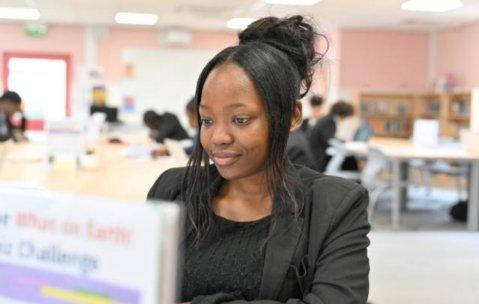
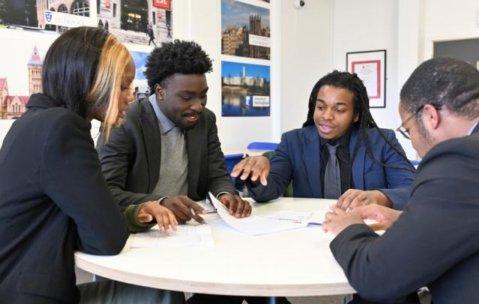
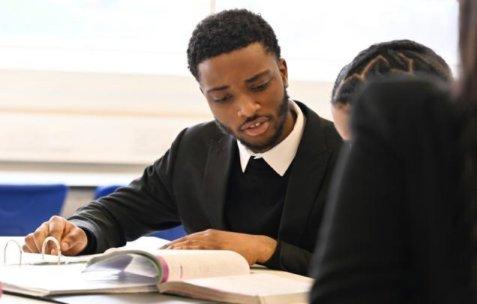
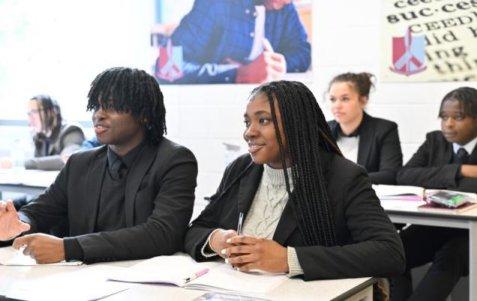
STAC Beyond 18
Our Rationale
At St Thomas the Apostle College, we believe that every student has the potential to shape their own future, and the right guidance can turn aspirations into reality. That’s why we have designed a dynamic and empowering careers programme that puts students at the centre
Our programme equips students with the knowledge, skills, and confidence to make informed decisions, plan strategically, and take meaningful steps toward their goals. Armed with this knowledge, we encourage every student to explore their ‘possible selves’ because no career, ambition, or pathway is out of reach.
With expert advice, real-world insights, and tailored support, we ensure that when our students leave us, they do so ready to thrive not just in education and work, but in life. Every story has a start. Where will yours take you?
Our Philosophy
We understand that students are individuals who need to be supported to choose a route that’s right for them and so we would fully expect and encourage students to be part of more than one programme
We see our role in a student’s journey as going beyond 18 when they leave us and our programme is bespoke and responsive to the needs of our students and changes in the post 18 landscape.
Our Partnerships
We work in partnership with numerous universities, apprenticeship providers, employers and external providers to make sure that all students receive expert and up to date guidance
STAC Beyond 18
Our Programme:
We have shaped our programme around three areas of focus:
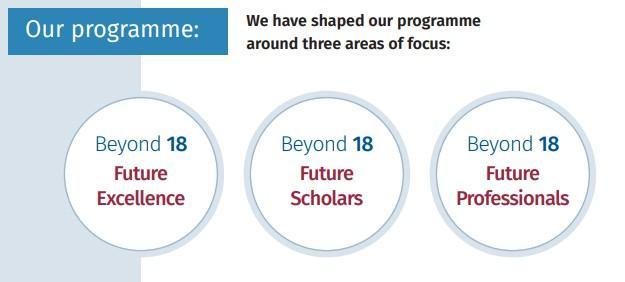
Each strand has been carefully planned so our students will succeed. You will note that our programmes ensure parity of support regardless of which post 18 pathway a student chooses to follow.

STAC Beyond 18
The Programme
Beyond 18: Future Excellence
Our wraparound programme will be undertaken by all students and serves to prepare students for both academic and professional life.
Oursupportincludes,butisnotlimitedto:
• Minimum 2 weeks work experience.
• Careers and futures week.
• Fully funded weekly enrichment programme.
• Oracy and debating training.
• Super-curricular programme: including a fully funded platform and bespoke resources.
• Sport and cookery masterclasses.
• Networking masterclasses.
• Access to extensive alumni network.
• Independent careers advisor.
• Leadership training.
• Scholarship application support.
Beyond 18: Future Scholars
Our programme serves to help prepare students for the most competitive universities and courses, including Oxbridge, Medicine and Dentistry.
Oursupportincludes,butisnotlimitedto:
• Admissions test preparation, including bespoke schedules.
• Weekly meetings.
• Easter and Summer academic training camps.
• Application mentoring.
• Student led academic societies, including discrete Medicine society.
• Interview preparation, including multiple mock interviews.
STAC Beyond 18
The
Programme
Beyond 18: Future Professionals
Our programme serves our students who wish to embark on an apprenticeship or degree apprenticeships.
Oursupportincludes,butisnotlimitedto:
• Dedicated careers team.
• Student led apprenticeship society.
• Extensive calendar of guest speakers and industry panels.
• Application mentoring.
• Specialist CV support.
• Assessment centre support.
• Psychometric test preparation.
• Interview preparation, including multiple mock interviews.

DESTINATIONS
Below are some of our previous students’ destinations and the degrees they have studied:

3-D Design
WHAT WILL I LEARN? Autumn
Project 1: Skills and Concepts
• How to structure and organise sketchbooks
• Researching and investigating ideas through drawing
• Materials and processes suitable for developing ideas
• Analysing and responding to the work of others.
Project 3: Component 1
• Evidence their engagement with a purposeful and meaningful project and this needs to be reflected in how they select and present their work.
• Produced the supporting written element of 1000 to 3000 words.
• The World of Art
Project 2: Development of Skills and Concepts
• Work based on their response to a personal issue, interest or concern
• How to organise and present work effectively
• Produce an initial project which reflects a sustained and in-depth period of study.
Externally set assignment: Component 2
• There is a separate externally set assignment paper for each title
• Students must select and respond to one starting point from their chosen title
• Examples of starting points from previous years can be found for reference within the Centre Services section of the AQA website
Project 3: Component 1
• Developing work based on their response to a personal issue, interest or concern
• Developing ideas explored in previous study
• Work with increasing independence
Super Curricular Resources
A series published by Thames and Hudson includes an extensive collection of titles covering all aspects of art, craft and design.
• Dorling Kindersley Eyewitness Guides - include a number of titles which provide an introduction to the work of artists, movements and themes, and the history and art of different cultures.
• Oxford History of Art
A series which includes a wide range of titles related to the history of art.
• Phaidon Colour Library
Contains 40-plus titles including artists’ work from different cultures and movements
https://www.tate.org.uk/art/black-identitiesand-art
https://filestore.aqa.org.uk/resources/art-anddesign/AQA-GCSE-ART-RL.PDF
https://www aqa org uk/resources/art-anddesign/as-and-a-level/art-and-design/teach/ subject-specific-vocabulary
https://www.vam.ac.uk/ https://artsandculture.google.com/
https://designmuseum.org/discover-design https://www.impressions-gallery.com/ https://www.bl.uk/learning
https://www.saatchigallery.com/learning https://www.britishmuseum.org/learning/ schools_and_teachers.aspx
https:// www.youtube.com/ watch?v=8_-aI0xzBrk
https:// www.youtube.com/ watch?v=LKDf0ssBt6c
https:// www.youtube.com/ watch?v=jjCJaX4w2Kg
https:// www.youtube.com/ watch?v=ZXgnLaNHvlI
https:// www.youtube.com/ watch?v=W7QltLDUzFQ
https:// www.youtube.com/ watch?v=Vky5vyEmdQA




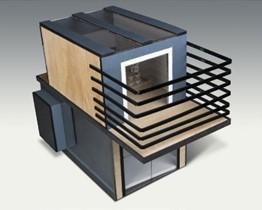
EXTRA CURRICULAR OPPORTUNITIES & OTHER INFORMATION
Exam Board: AQA
https://www aqa org uk/subjects/art-and-design/as-and-a-level/art-and-design-7201/specification-at-aglance
The Art department offers a full co-curricular programme, including visits to places such as: The Design Museum, The Victoria & Albert Museum, Twist Museum, Balloon Museum, Tate Modern, Natural History Museum, British Museum, British Library and a range of other iconic London landmarks
Recommended Subject Combinations
Creative Subjects (Art & Crafts, Textiles, Graphics and Photography)
STEM Subjects (Science, Maths, Engineering and Technology)
WHAT CAREERS DOES THIS LEAD TO?
Higher Education
Degrees in: Fine Art, Sculpture, Textiles, Graphics, Architecture, Engineering or Digital design
Careers
Employment: Product Designer, Engineer, Architect, Carpenter, Technologist, Electrician, Fashion designer, Web/Digital software designer, Mechanic etc.
ENTRY REQUIREMENTS
Grade 6 in Art or Design Technology
Grade 6 in GCSE English Language
Year 12
Year 13
Biology
WHAT WILL I LEARN?
Autumn Spring
• Cell Structure and division, Biological molecules and Enzymes, Transport across membranes
• Respiration, Photosynthesis, Nervous co-ordination, Energy and Ecosystems, Nutrient cycles, Synoptic Essay Training.
• Mass Transport, Exchanges with the Environment, Immunity
• Inheritance, Homeostasis, Muscle structure, DNA techniques, Synoptic Essay Training
Summer
• Biodiversity, Classification, Genetic Diversity, Evolution, Field work.
• Revision Programme
Super curricular Resources
Ashcroft, F. (2012) The SparkofLife:Electricityin theHumanBody . London: Penguin Books.
Buchanan, B.B., Guissem, W. & Jones, R.L. (2000) Biochemistryand MolecularBiologyof Plants New York: John Wiley and Sons Ltd.
Jennings, D.H. & Lysek, G. (1999) FungalBiology:UnderstandingtheFungal Lifestyle,2nded Oxford: BIOS Scientific Publishers Ltd.
http://www.ibiblio.org/virtualcell/ index.html
http://www.accessexcellence.org/ RC/VL/GG
http://www.uq.oz.au/nanoworld
http://www.dnai.org/a/index.html
http://nature.com
http://royalsociety.org
http://www.nhm.ac.uk
TedTalks.
Science with Katie
Get Revising
Martyn Poliakoff
BBC ideas
The Disruptors

EXTRA CURRICULAR OPPORTUNITIES & OTHER INFORMATION
Exam Board: AQA
Exam Specification
Students will be given the opportunity to help run STEM clubs, will have opportunities linked with the London School of Tropical Medicine and Hygiene, as well as Lewisham Hospital.
Recommended Subject Combinations
Chesmistry
Maths
Physics
WHAT CAREERS DOES THIS LEAD TO?
Higher Education
Degrees in: Biology, Environmental Science, Medicine, Physiotherapy, Nursing, Dentistry, Psychology, Pharmacy and more.
A Higher National Course in Biological Science, or other related programmes. Careers
Employment in: Pharmacy, Biotechnology, Catering, Land Management
ENTRY REQUIREMENTS
Grade 7 in GCSE Biology (Triple) Science or 7-8 in GCSE Combined Science
Grade 6 in GCSE English Language
Grade 6 in GCSE Maths
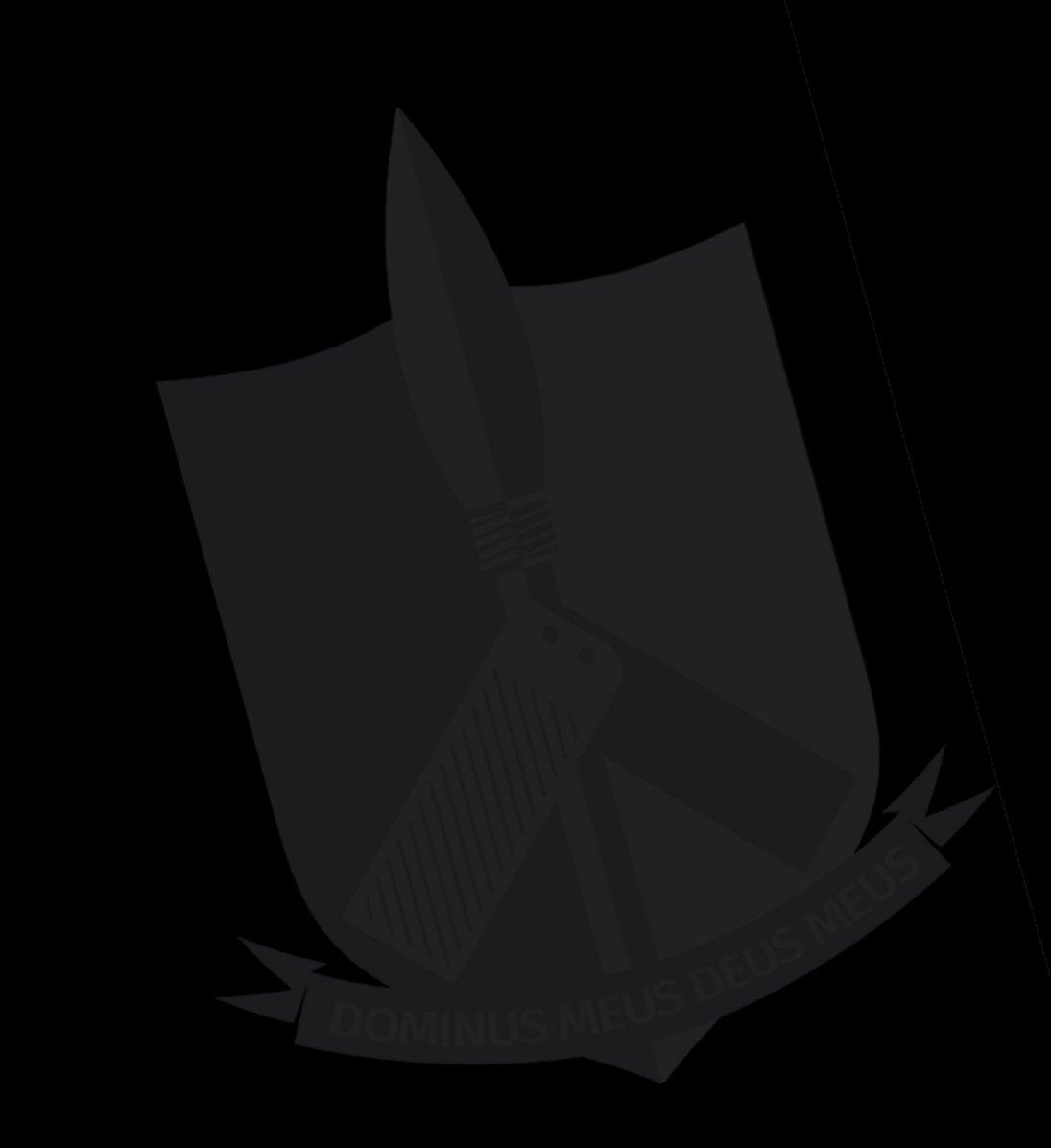
Business Studies
WHAT WILL I LEARN?
• Business Activity
• Leadership and Decision making
• Marketing
• Operations Management
• Finance
• Strategic position
• External Influences of Business
• Strategic Direction
• Strategic Methods
• Managing Strategic Change
• Finance
• Human Resources
Revision, Exam Prep and Final Exams:
• Paper 1: 2 hours, worth 33.3% of course
• Paper 2: 2 hours, worth 33.3% of the course
• Paper 3: 2 hours, worth 33.3% of the course
Super Curricular Resources
The Lean Startup by Eric Ries
Crossing the Chasm by Geoffrey Moore
The Hard Thing about Hard Things by Ben Horowitz
Tony J. Watson (2006) Organisingand managingwork:organisational,managerialandstrategicbehaviourin theoryandpractice/TonyJ.Watson.2nd edition. Harlow, Pearson Longman.
www.bized.co.uk
www.businesscasestudies.c o.uk
www.bbc.co.uk/news/ business
Tutor2u.
Study Rocket BBC ideas
A level politics UK and global podcast

EXTRA CURRICULAR OPPORTUNITIES & OTHER INFORMATION
Exam Board: AQA
Exam Specification
Recommended Subject Combinations
Geography
Psychology
English Literature
Mathematics
MFL
Higher Education
WHAT CAREERS DOES THIS LEAD TO?
Degrees in: Accounting, Management, Marketing
Apprenticeships in Accounting and Finance
Careers
Employment in: Management, Finance , Marketing,, Human Resources
ENTRY REQUIREMENTS

Grade 6 Maths
Grade 6 English Language
Grade 6 in GCSE Business is desirable but not essential
Year 12
WHAT WILL I LEARN?
Autumn Spring Summer
• Atomic structure, Amount of substance, Energetics, Bonding, Kinetics, Introduction to organic chemistry, Alkanes, Halogenoalkanes
• Rates, Thermodynamics, Acids and bases, Electrode potentials, Kp (Equilibrium constant), Organic analysis, Carbonyl compounds
• Equilibrium, Redox, Group 2, Group 7, Alkenes, Alcohols, Organic analysis
• Transition metals, period 3 oxides, Aromatics, Amines, Polymers, Amino acids, Proteins and DNA, Organic synthesis
• Revision Year 13
• Revision
Super Curricular Resources
Solen and Harb, Introduction to Chemical Engineering: Tools for Today and Tomorrow
Denn, Chemical Engineering: An Introduction
www.rsc.org.uk
www.icheme.org
www.chemguide.co.uk
https://royalsociety.org/scienceevents-and-lectures/2020/summerscience-online/programme/monday/
Chemical Engineering: Challenges and Opportunities
Oxford Sparks: Bringing Oxford Science to life
TedTalks. Science with Katie Get Revising Martyn Poliakoff
BBC 4: chemistry of addiction
BBC ideas The Disruptors

EXTRA CURRICULAR OPPORTUNITIES & OTHER INFORMATION
Exam Board: AQA
Exam Specification
Students will be ale to participate in Chemistry intervention sessions, have Chemistry Lecture trips at UCL, participate in the Chemistry Olympiad, and be part of the Spectroscopy in a Suitcase workshop
Recommended Subject Combinations
Biology
Mathematics
Physics
WHAT CAREERS DOES THIS LEAD TO?
Higher Education
Degree in: Chemistry, Environmental Science, Medicine, Pharmacy of Biochemistry
A Higher National Programme in Applied Chemistry, or related programmes such as Sports Studies, Beauty Therapy, Applied Biology, Engineering, Agriculture, Animal Management, Countryside Management, Environmental Science, Horticulture, etc. Careers
Employment in: Pharmacy and Biotechnology
ENTRY REQUIREMENTS

Computer Science
WHAT WILL I LEARN?
• Structure and function of the processor
• Types of processor
• Input, output and storage
• Programming techniques
• Data Types
• Boolean Algebra
• Elements of computational thinking
• Computational methods
• Develop programming project
• Algorithms
• Data Structures
• Types of Programming Language
• Systems Software
• Applications Generation
• Networks
• Web Technologies
• Software Development
• Computing related legislation
• Moral and ethical Issues
• Compression, Encryption and Hashing
• Databases
• Start the programming project
• Revision
Super Curricular Resources
The Code Book: The Secret History of Codes and Codebreaking
Dewdney, The New Turing Omnibus: 66 Excursions in Computer Science
Gribbin, Computing with Quantum Cats
http://www.tnmoc.org/
http://pcpro.com
http://www.theregister.co.uk/
University of Oxford

EXTRA CURRICULAR OPPORTUNITIES & OTHER INFORMATION
Exam Board: OCR
Exam Specification
Recommended Subject Combinations
Maths
Science
WHAT CAREERS DOES THIS LEAD TO?
Higher Education
Degree in: Computing, Computer Engineering
Careers
Employment in: Science, Engineering, Computer Programming, Medical Science, Education
ENTRY REQUIREMENTS
Grade 7 or higher in GCSE Computer Science
Grade 7 in GCSE Mathematics
If Computer Science not taken at GCSE, Grade 8 Maths will suffice

Year 12
Economics
WHAT WILL I LEARN?
Autumn Spring Summer
• Micro: economics principles. Demand and Supply, Consumer and Producer Surplus, Subsidies and taxes Market Failure
• Macro: government objectives, Circular flow of income, AD-AS analysis, Economic growth
• Micro: market structures, Behavioural Economics, Business Economics
Year 13
• Macro: financial markets, Banks, Macroeconomics Objectives recap
• Micro: market failure, Business Economics, Market Structures
• Macro: economic performance, Inflation, Balance of Payments, Monetary Policy
• Micro: income distribution, Labour Market, Poverty and Inequality, Government Intervention and Failure
• Macro: International economy, Exchange Rates, Balance of Payments, Poverty and Inequality
• Micro: market structures, Government Intervention, Behavioural Economics
• Macro: government policy , Fiscal Policy, Supply Side Policies
• Micro: exam preparation
• Macro: exam preparation
Super Curricular Resources
Books Websites
Dasgupta, P (2007), Economics: A Very Short Introduction, Oxford University Press
Rodrik, D (2015) Economics Rules: Why Economics Works, When It Fails, and How To Tell The Difference, Oxford University Press.
Varian, H (2014), Intermediate Microeconomics, Norton.
Mankiw, N G and M P
Taylor, Macroeconomics, European Edition
The Economist
www.tutor2u.net
https://www.bbc.co.uk/news/ business/economy
www.economicsonline.com
www.adamsmithinstitute.org
Maths for Economists Collection
National Institute of Economic and Social Research
YouTube Podcasts
Tutor2u.
Real Life Lore
TedTalks. Econplusdal
BBC ideas
Earn & Invest
Smart People Podcast
Wake up to Money Podcast
Freakonomics
50 Things that made the Modern Economy

EXTRA CURRICULAR OPPORTUNITIES & OTHER INFORMATION
Exam Board: AQA
Exam Specification
The Economics department offers a full co-curricular programme, including visits to places such as: the Bank of England, the Financial Times, JP Morgan, Morgan Stanley and other firms in the City of London.
The department also offers internal opportunities such as talks from the Bank of England and the Economics Research Council, as well as joining the Economics Book Club
Recommended Subject Combinations
Humanities Subjects (History, Geography, Philosophy)
Politics
Psychology/Sociology
Essential to study Mathematics at A-Level if you want to study Economics at University
WHAT CAREERS DOES THIS LEAD TO?
Higher Education
Degrees in: Business, Economics, Law, Accountancy, Maths, International Relations, and other social science subjects
Careers
Employment in: Accountancy, Finance, Consultancy, Sales, Banking Management, Human Resources and the Public Sector
ENTRY REQUIREMENTS
Grade 6 in GCSE English, Maths, Economics (if applicable) and any Humanities subject.

English Literature
WHAT WILL I LEARN?
• Drama: DuchessofMalfi
Exploring themes such as gender, class and religion.
• Poetry: Larkin ‘The Less Deceived’ collection
We will study Larkin’s seminal collection of poems and discuss his outlook on how to live and be in a modern society. Themes we will explore include: post-war life, the necessity to appreciate death is inevitable and the dwindling importance of institutions. We will learn how to make connections between poems.
• Prose: Coursework texts: TheColorPurple and TheirEyesWereWatchingGod
We will study the significance of these AfricanAmerican texts and how they are situated within American history. For your coursework, you will be comparing the way in which the protagonists of each novel develop their identities through themes such as spirituality and gender roles.
• Poetry: Modern poetry from ‘Poems of the Decade’ anthology’
We will be studying the poems in this modern anthology that address themes such as masculinity, relationships and the interconnection between past and present. We will learn how to make comparisons between these poems and unseen poems.
• Prose: HeartofDarknessand LonelyLondoners
We will study these two novels alongside each other. Heart of Darkness is a novel about a voyage up the Congo river. Lonely Londonersis a novel about immigrant life in 1950s London. Both novels explore themes of identity, and race and how the characters integrate into new communities.
• Drama: Othello
Shakespeare’s Othelloexplores finding love across racial lines. In class, we will also study critical perspectives of this play and practice integrating these into our essays, preparing you for university studies.
• Revision
• Revision and coursework preparation
• Revision and exams
Super Curricular Resources
Auerbach, Mimesis: The Representation of Reality in Western Literature
Ghosts of my Life: Writings on Depression, Hauntology and Lost Futures
The Discarded Image: An Introduction to Medieval and Renaissance Literature
The Body in Pain: The Making and Unmaking of the World Stewart
http://www.universalteacher.org.uk/
http://www.phon.ucl.ac.uk/
www.englishlangsfx.blogspot.com/
https://writersmakeworlds.com/ writers/
London Review of Books
The Guardian Books
The British Library
MASSOLIT
TLS Literature
The Poetry Society
Great Writer’s Aspire
BBC Radio 4: In Our Time, Culture
Audiopi
Close Readings
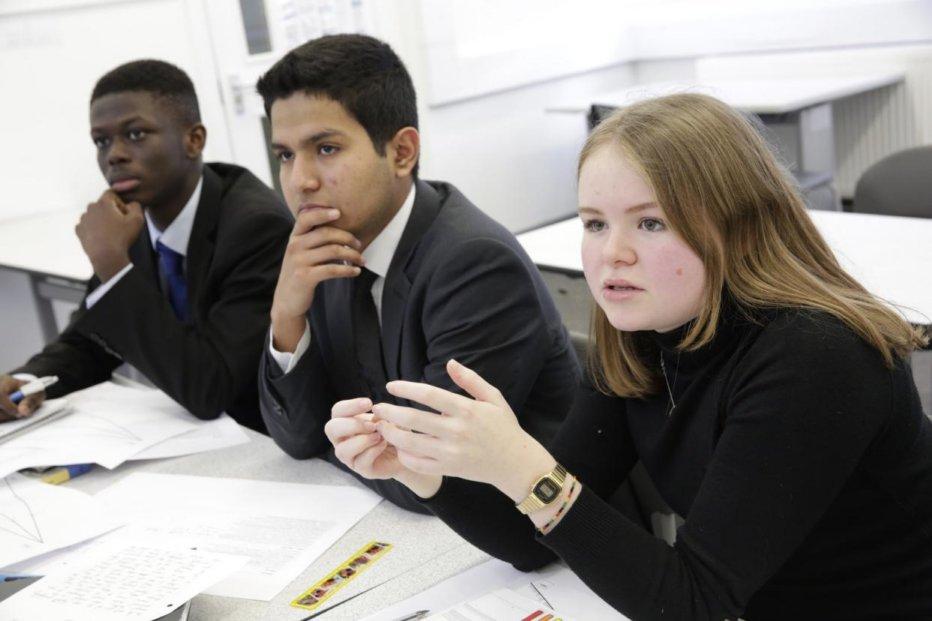
EXTRA CURRICULAR OPPORTUNITIES & OTHER INFORMATION
Exam Board: Edexcel
Exam Specification
The department arranges visits to theatres, galleries. We also arrange to have outside speakers visit the college to enhance the students’ understanding of literature.
Recommended Subject Combinations
Humanities subjects (History, Philosophy and Ethics, Geography)
Psychology/Sociology
Business Studies
In general, English works well with any combination of subjects as it will enhance your skills in
WHAT CAREERS DOES THIS LEAD TO?
Higher Education
Degree in: English Literature, Journalism, other Humanities subjects. Careers
Employment in: Journalism, Politics, Public Relations, Human Resources, Project Management, Advertising, Marketing, Publishing, Law, and other creative industries.
ENTRY REQUIREMENTS
Grade 6 or above in GCSE English Language and Literature

Further Maths
WHAT WILL I LEARN?
Super Curricular Resources
Imagining Numbers: (Particularly the Square Root of Minus Fifteen)
Things to Make and Do in the Fourth Dimension
Infinite Powers: The Story of Calculus - The Language of the Universe
http://mathsbank.co.uk/
https://archive.org/details/
http://patrickjmt.com/
https://www.maths.ox.ac.uk/aboutus/life-oxford-mathematics/oxfordmathematics-alphabet
http://www.maths.ox.ac.uk/events/ public-lectures-events
Plus Maths: Living Mathematics
ics

EXTRA CURRICULAR OPPORTUNITIES & OTHER INFORMATION
Exam Board: Edexcel
Exam Specification
Recommended Subject Combinations
MUST study Mathematics
Physics
Chemistry
Computer Science
Economics
WHAT CAREERS DOES THIS LEAD TO?
Higher Education
Degree in: Mathematics, Economics Careers
Employment in: Engineering, Computer Science, Finance, Economics
ENTRY REQUIREMENTS
Grade 9 in GCSE Maths
Grade 8 in GCSE Maths & a pass on an internal baseline test
Additional/Further Maths GCSE desirable

Geography WHAT WILL I LEARN?
• Paper 1: Water & Carbon
• Paper 2: Global Systems & Global Governance
• Paper 2: Population & the Environment
• Paper 1: Coastal Systems & Landscapes
• Paper 2: Changing Places
• Paper 1: Hazards
• Coursework
• Revision
Super Curricular Resources
Prosperity without growth: economics for a finite planet Klein
This Changes Everything: Capitalism vs the Climate Massey
e Great Flood: travels through a sodden landscape Solnit
http://www.s-cool.co.uk/a-level/ geography
http://www.edexcel.com/subjects/ Geography
/Pages/Useful-websites.aspx
http://www.georesources.co.uk/ indexalevel.html
National Geographic
The Economist
Royal Geographical Society
CrashCourse. BBC ideas
Revise - A Level Geography Revision
Ask the geographer
Costing the Earth

EXTRA CURRICULAR OPPORTUNITIES & OTHER INFORMATION
Exam Board: AQA
Exam Specification
The course offers field trips and various lectures
Recommended Subject Combinations
Economics
Biology
WHAT CAREERS DOES THIS LEAD TO?
Higher Education
Degrees in: Geography, Tourism and other related environmental disciplines Careers
Employment in: Environment Agency, Town Planning. Non-Governmental Organisations, Disaster Management
ENTRY REQUIREMENTS
Grade 6 in GCSE Geography
Grace 6 in English Language


WHAT WILL I LEARN?
• Cold War – Origins 1945
• Tudors – Mid- Tudor Crisis 1547-1558
• Coursework
• Civil Rights – African Americans
• Cold War – Development of the CW 1945-1955 and 19561984
• Tudors – Elizabethan England
• Coursework
• Civil Rights – Trade Union and Labour Rights, Native Americans
• Cold War – End of the CW 1984-1995
• Tudors – Elizabethan England and Coursework
• Civil Rights – Women
• Revision
Super Curricular Resources
Boyd-Hilton, A Mad, Bad and Dangerous People? England 1783-1846 Butterfield,
The Whig Interpretation of History Clark
The Sleepwalkers: How Europe Went to War in 1914 Gaddis
Lawrance, Me, Me, Me: The Search for Community in Post-war England Roper
A Concise Companion to History Saïd, Orientalism
www.history.org.uk
www.massolit.io History Lectures
www.historyextra.com BBC history magazine articles
www.historytoday.com
History: British History in depth
Black Cultural Archives
‘You’re Dead to Me’ BBC Radio 4
‘In Our Time’ BBC Radio 4
Massolit History Lectures
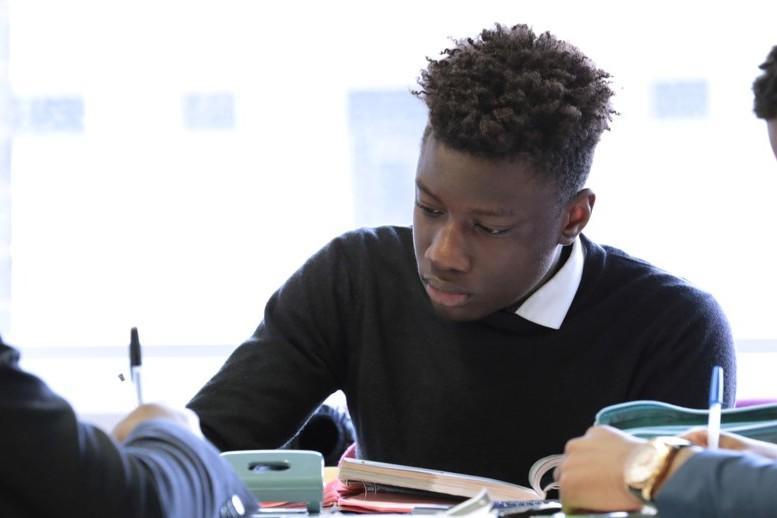
EXTRA CURRICULAR OPPORTUNITIES & OTHER INFORMATION
Exam Board: OCR
Exam Specification
Recommended Subject Combinations
Any Humanities subjects such as:
Geography
Economics
Philosophy & Ethics
English Literature
WHAT CAREERS DOES THIS LEAD TO?
Higher Education
Degree in: History, Philosophy, Law and other Humanities subjects Careers
Employment in: Journalism, Law, Education, Research, Archaeology, Politics, Business
ENTRY REQUIREMENTS

Grade 6 in GCSE History
Grade 6 in GCSE English Language
Students with Grade 7 in any other Humanities subjects will be considered on an individual basis
Mathematics
WHAT WILL I LEARN?
• Pure Maths & Statistics
• Pure Maths & Statistics
• Pure Maths & Mechanics
• Pure Maths & Mechanics
• Revision
• Pure Maths & Statistics
• Revision
• Revision
Super Curricular Resources
Alcock, How to Think About Analysis Penrose,
The Emperor's New Mind: Concerning Computers, Minds, and the Laws of Physics
Singh, Fermat’s Last Theorem
Dunham, Euler: the Master of Us All
http://mathsbank.co.uk/
https://archive.org/details/ http://patrickjmt.com/
https://www.maths.ox.ac.uk/aboutus/life-oxford-mathematics/oxfordmathematics-alphabet
http://www.maths.ox.ac.uk/events/ public-lectures-events
Plus Maths: Living Mathematics
TL Maths
patrickJMT
Oxford Mathematics
Ted Talk: Math Talks to Blow your Mind
The NCTEM Maths Podcast
Math ED Breaking Math
The Secrets of Mathematics

EXTRA CURRICULAR OPPORTUNITIES & OTHER INFORMATION
Exam Board: Edexcel
Exam Specification
Recommended Subject Combinations
Further Maths
Physics
Chemistry
Economics
Computer Science
WHAT CAREERS DOES THIS LEAD TO?
Higher Education
Degree in: Maths, Statistics, Physics, Astronomy, Engineering, Computer Science, Economics, Actuarial Science and Medicine
Careers
Employment in: Architecture, Biology, Chemistry, Psychology
ENTRY REQUIREMENTS
Grade 7 in GCSE Maths

Year 12
Music
WHAT WILL I LEARN?
• AoS A: Western Classical Tradition
• ABRSM Music Theory
• Weekly instrumental lessons & practice
• Composing in a Classical style
• AoS D: Jazz
• ABRSM Music Theory
• Weekly instrument lessons & practice
• Composing in jazz styles
Year 13
• AoS A: Western Classical Tradition
• Set Brief Composition
• Weekly instrumental lessons & practice
• AoS E: Into the 20th Century & AoS D: Jazz
• Mock Exam
• Free Composition
• Final exam recital
• AoS E: Into the 20th Century
• Revision for UCAS Exams
• ABRSM Grade 5 Theory Exam
• Instrumental Exams
• Composing in 20th Century style
• Revision
Super Curricular Resources
BBC Music Magazine
Music Theory: the Essential Guide (Faber Edition) Music theory
https:// teoria.com/ https:// www.musicca.co m/
Search for Eduqas A level playlists on spotify
https://www.youtube.com/ @tompankhurst
https://www.youtube.com/ @MusicMattersGB
https://www.youtube.com/user/ Lso/playlists
https://www.youtube.com/ watch?v=DLlz6m-9uHo
‘Add to Playlist’ 6 Music
‘3 in a bar’
BBC Radio 3
The Listening ServicePodcast
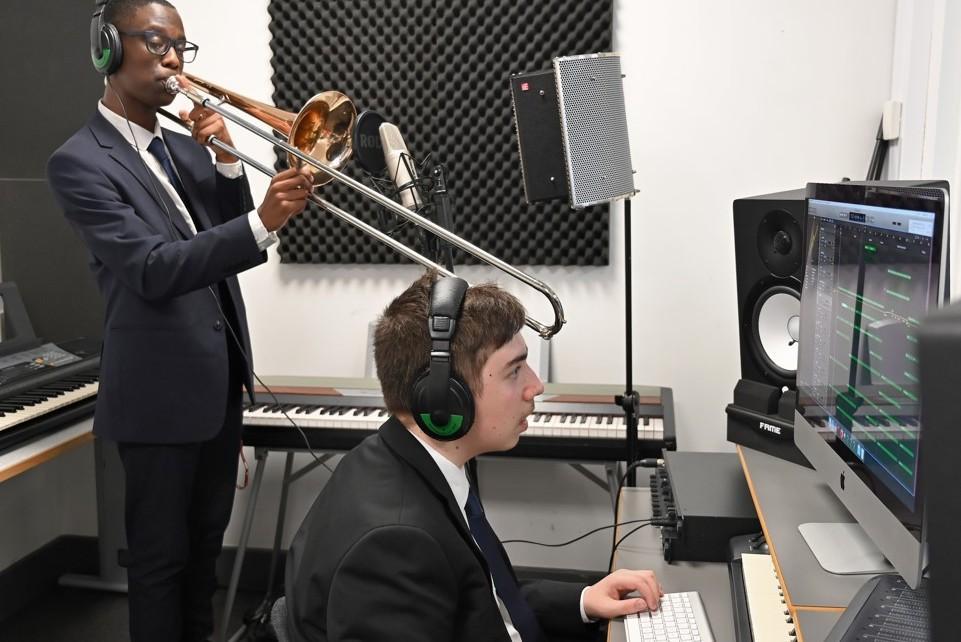
EXTRA CURRICULAR OPPORTUNITIES & OTHER INFORMATION
Exam Board: Eduqas
Exam Specification
Recommended Subject Combinations
Any other subject
WHAT CAREERS DOES THIS LEAD TO?
Higher Education
Degree in: Music, Theatre, Music Technology, Media Studies
Careers
Employment in: Performance, Composition, Sound Engineering, Production
A Music qualification can enhance a CV and lead into any career, showing employers
creativity and academic ability.
ENTRY REQUIREMENTS
Grade 6 at GCSE Music or a Grade 5 theory pass
Grade 3+ instrumental exam pass
Basic keyboard skills
Confidence in reading music notation
N.B Students without music theory experience you will be required to take compulsory classes offered by the music department as part of their essential development during the course
N.B Students who do not have GCSE music will be required to do a series of entry tests to show that they have the music knowledge required to meet the demands of the course

Philosophy & Ethics WHAT WILL I LEARN?
Autumn Spring Summer
• Developments in Christianity: Augustine and Human Nature; Life after Death; Natural and Revealed knowledge of God; Jesus Christ. Philosophy: Introduction to Philosophy; Ancient Philosophy
• Philosophy: Nature of God; Religious Language. Developments in Christianity: Religious Pluralism. Ethics: Metaethics; Conscience
• Developments in Christianity: Moral Principles; Moral Action and Bonhoeffer; Philosophy: Soul, Mind and Body; Existence of God
• Ethics: Natural law; Kantian Ethics; Situation Ethics; Utilitarianism; Euthanasia; Business Ethics
• Developments in Christianity: Gender; Secularism; Liberation Theology. Ethics: Sexual ethics
• Revision of year 12 and year 13 content
Super Curricular Resources
The Pig that wants to be Eaten by Julian Baggini.
Western Philosophy: An Anthology edited by John Cottingham.
The VeryShortIntroductionseries. You can find the full list (around 800 titles!) here https:// global.oup.com/ academic/content/series/ v/very-short-introductions -vsi/?
type=listing&lang=en&cc= gb –
The Puzzle of Ethics Peter Vardy and Paul Grosch
SCM Study Guide to Christian Ethics Neil Messer;
https://peped.org/
https://www.newadvent.org/
https://ocr org uk/qualifications/ as-and-a-level/religious-studiesh173-h573-from-2016/
https:// laurenrevisesphilosophy.wordpress.com/
https:// sandringham.herts.sch.uk/wpcontent/uploads/2020/06/A-level -Phil-Ethics-and-Theology-Widerreading-list-2020.pdf
https://www.massolit.io/
Crash Course Philosophy: https:// www.youtube.com/ watch?
v=BNYJQaZUDrI&lis t=PL8dPuuaLjXtNgK 6MZucdYldNkMybYI HKR
Panpsycast Philosophy Bites Philosophize
This!
In Our Time: Philosophy – BBC
Radio 4
Philosophy Now Podcasts: https:// philosophynow.org/ podcasts
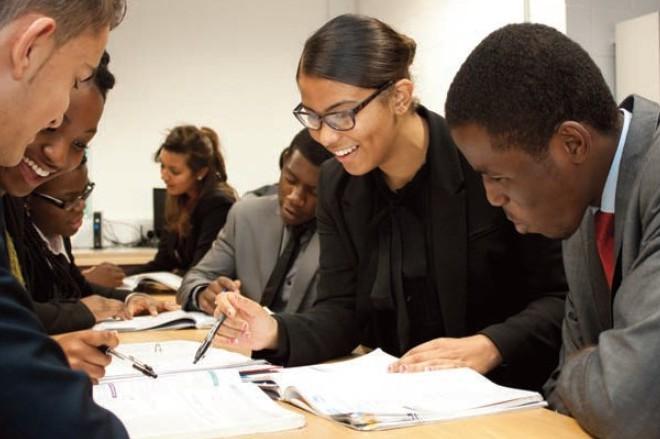
EXTRA CURRICULAR OPPORTUNITIES & OTHER INFORMATION
Exam Board: OCR
Exam Specification
Recommended Subject Combinations
English Literature
History
Mathematics
Biology
Psychology
WHAT CAREERS DOES THIS LEAD TO?
Higher Education
Degrees in: Philosophy, Theology, Religious Studies, PPE (Politics, Philosophy, Economics) or joint honours degree with any other subject
Careers
Employment in: Civil Service, Politics, Law, Journalism, Research, Teaching
ENTRY REQUIREMENTS
Grade 6 in GCSE Religious Education
Grade 6 in GCSE English Language
Possible combination with BTEC

Physical Education
• Cardiovascular System
• Respiratory System
• Skill Continua & Transfer
WHAT WILL I LEARN?
• Muscular-Skeletal
• Neuromuscular
• Methods of Practice
• Training Methods
• Injury
• Info Processing
• Biomechanics
• Theories of Learning
• Energy Systems
• Revision
• Analysis and Evaluation of Performance.
•
• Revision
Super Curricular Resources
The Talent Code: Greatness Isn't Born. It's Grown. Here's How.
Black Box Thinking: The Surprising Truth About Success
https:// theeverlearner.com/
Atomic Habits : James Clear
Shoe Dog: A Memoir by the Creator of NIKE
How (Not) To Be Strong – Alex Scott
Physiology of Sport and Exercise by W Larry Kenney, Jack H Wilmore, and David L Costil 2020
Foundations of Sport and Exercise Psychology by Robert S Weinberg and Daniel Gould 2019
www.mypeexam.com
www.sportengland.or g
Everlearner
Pacey Performance Podcast –By sports smith
James Morris. Brookbush Institute
The Huberman Lab
The High Performance Podcast

EXTRA CURRICULAR OPPORTUNITIES & OTHER INFORMATION
Exam Board: AQA
Exam Specification
Recommended Subject Combinations
Science (particularly biology and physics)
Maths
Psychology
History
English literature
WHAT CAREERS DOES THIS LEAD TO?
Higher Education
Degree in: Science, such as Biology, or Sport & Science
Careers
Employment in: Sport Psychology, Physiotherapy, Sports Journalism, Sports Coaching
ENTRY REQUIREMENTS
Grade 6 in GCSE Biology, Chemistry and Physics (if studied triple science)
Grade 6-6 in GCSE Science (if double science)
Grade 6 in GCSE PE desirable, but not essential
Membership of a competitive sports club in one sport, playing competitively


EXTRA CURRICULAR OPPORTUNITIES & OTHER INFORMATION
Exam Board: AQA
Exam Specification
The course offers various opportunities, such as the chance to join STEM club, have extra interventions and trips.
Recommended Subject Combinations
Mathematics
Further Mathematics
Chemistry
WHAT CAREERS DOES THIS LEAD TO?
Higher Education
Higher National Programmes (HNC & HND) to degree level coursers, studying subjects such as; Physics, Medicine, Engineering
Careers

Employment in areas such as Medicine, Radiography, Mechanical/Electrical/Civil Engineering
Supporting careers in Biotechnology or Chemical Engineering
ENTRY REQUIREMENTS
Grade 7 in GCSE Physics (Triple) Science or 7-8 in GCSE Combined Science
Grade 7 in GCSE Maths
MUST CHOOSE Maths for A-Level
WHAT WILL I LEARN?
• Approaches and Research Methods, Social Influence
• Biopsychology, Psychopathology • Attachment, Memory and revision
Books
• Issues and Debates, Research methods, Aggression
• Relationships, Schizophrenia and revision • A Level Exams
Super Curricular Resources
Cognitive Psychology: A Student’s Handbook Damasio,
Self comes to mind: constructing the conscious brain Hogg and Vaughan, Essentials of Social Psychology Hrdy,
Mothers and Others: The Evolutionary Origins of Mutual Understanding
How the Mind Works Sacks
Key Concepts in Developmental Psychology Ward,
A Student’s Guide to Cognitive Neuroscience http://www.bps.org.uk
http://faculty.washington.edu/ chudler/neurok.html
www.tutor2u.net
https://senecalearning.com/en-GB/ blog/a-level-psychology-revision/
https://quizlet.com/subject/aqapsychology/
https://studyrocket.co.uk/revision/alevel-psychology-aqa
Nature Human Behaviour
CrashCourse.
Psych Boost.
TedTalks.
BBC Radio: why do certain chords make us feel sad?
BBC Radio: Inside the brain of a 5-year-old
BBC radio 4: How can you feel less lonely?

EXTRA CURRICULAR OPPORTUNITIES & OTHER INFORMATION
Exam Board: AQA
Exam Specification
Recommended Subject Combinations
Biology
Philosophy & Ethics
English
Mathematics
WHAT CAREERS DOES THIS LEAD TO?
Higher Education
Degrees in: Psychology , Social Science subjects, or any other subject Careers
Employment in: Psychology, Health,, Education, or any other graduate role
ENTRY REQUIREMENTS

Grade 6 in GCSE English Language
Grade 6 in GCSE Maths
Grade 6-6 in a minimum of two GCSE sciences (triple or double)
Spanish WHAT WILL I LEARN?
Autumn Spring Summer
• Introduction to A-Level Spanish
• Los valores tracidionales y modernos
• El ciberespacio
• Grammar foundations: present, preterite, imperfect, future
• Introduction to the themes of the film Volver: context, plot, background
• La inmigración
• El racism
• La Convivencia
• Grammar consolidation (focus on subjnctive compound tenses)
• Introduction to Como agua para chocolate: historical context, keu themes and essay questions
• Independent research project
Students develop research questions, gather evidence (primary or secondary) and analyse findings
Books
• La igualdad de los sexos
• La influencia de los ídolos
• La identidad regional en España
• Continued grammar practice, subjunctive
• In-depth film strudy of Volver: characters, themes, cinematrography
• Essay skills and critical interpretation
• Final essay writing on Volver
• Jóvenes de hoy, ciudadanos del mañana
• In-depth analysis of Como agua para chocolate: symbolism, characters, structure and essay questions
• Monarquías y dictaduras
• Los movimientos populares
• Revision and exam strategies and practice
• Final speaking preparation
• El patrimonio cultural
• Preparation for end-ofyear assessments and end -of-year speaking practice
• Exam Practice and revision strategies
• Independent research project
Students develop research questions, gather evidence (primary or secondary) and analyse findings.
• Revision and exam strategies and practice
• Final speaking preparation
Super Curricular Resources
Adger, Language Unlimited: The Science Behind Our Most Creative Power
Crystal, The Cambridge Encyclopedia of Language
Peterson, The Art of Language Invention
Roberts, The Wonders of Language, or How to Make Noises and Influence People
Duolingo https:// bookshelf.mml.ox.ac.uk/
University of Cambridge MML Preliminary Reading
The Linguist List
BBC Mundo
El Pais
Easy Languages
Change and Stability in native language of migrants
Language learning and creativity
The acquisition and evolution of linguistic variation
Coffee Break
Babbel
University of Oxford: Linguistics
Linguistics and Languages Podcast
BBC Mundo Podcasts
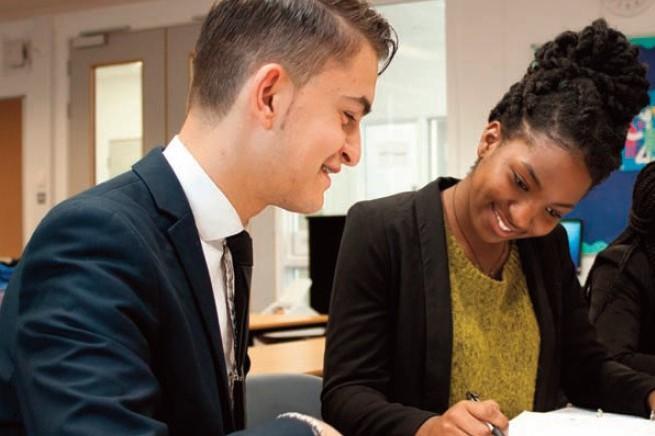
EXTRA CURRICULAR OPPORTUNITIES & OTHER INFORMATION
Exam Board: AQA
Exam Specification
Recommended Subject Combinations
English Literature
French
Italian
Maths
History
WHAT CAREERS DOES THIS LEAD TO?
Higher Education
Degree in: Spanish, Marketing, International Law/Relations, Business Careers
Employment in: Education, International Law, Counselling, Social Services, Customer Services, Sales, Marketing, International Trade, Translator, Interpreter, Linguist
ENTRY REQUIREMENTS
Grade 7 in GCSE Spanish

Books
Sociology WHAT WILL I LEARN?
Families and Households:
• Theories of the Family
• Couples
• Childhood Education:
• Role of education in Society
• Class differences in achievement
Beliefs in Society
• Theories of religion
• Religion and social change
• Secularisation
• Religion renewal and choice
• Religion in a global context
• Organisations, movements and members
• Ideology and science
Families and Households:
• Demography
• Changing family patterns
• Family diversity
Education:
• Ethnic differences in achievement Gender differences in education
Methods in Context
• Application of quantitative and qualitative research methods to the study of education.
Crime and deviance
• Functionalist, strain and subcultural theories
• Interactionism and labelling theory
• Class, power and crime
• Realist theories
• Gender, crime and justice
• Ethnicity, crime and justice
• Crime and the media
• Globalisation, green crime, human rights and state crime.
Families and Households:
• Families and social policy
Education:
• Education Policy and Inequality
Methods in Context
• Application of quantitative and qualitative research methods to the study of education.
Theories and Methods
• Sociology and Science
• Objectivity and Values in Sociology
Crime and deviance
• Control, punishment and victims
• Theories and Methods
• Sociological theories, structuralism, conflict and action.
• Globalisation, modernity and postmodernity.
• Sociology and social policy.
Curricular Resources
‘Thinking Sociologically’ Bauman, Z. and May, T. (2019) http:// www.sociology.org.uk/
‘The God Delusion’ – Richard Dawkins http:// www.statistics.gov.uk/
‘Cows, Pigs, Wars, and Witches.’ – Marvin Harris
‘Outliers’ – Malcolm Gladwell
The Tipping Point – Malcolm Gladwell
Chavs – Owen Jones
A Brave New World – Aldus Huxley, 1984 – George Orwell
https:// www.precookedsociology.co m/
[Twitter Accounts geared to AS and Advanced Level Sociology Units [Organised by Ken Browne]
https://www.tutor2u.net/ sociology
https://www.youtube.com/@TheTEACHERSOCIOLOGY
• TedTalks.
• Tutor2U
• The Sociology Guy: YouTube Channel
• Thinking Allowed
• The Social Breakdown
• Allsociology | take 1
• The Sociology Show
• Digital Sociology Podcast
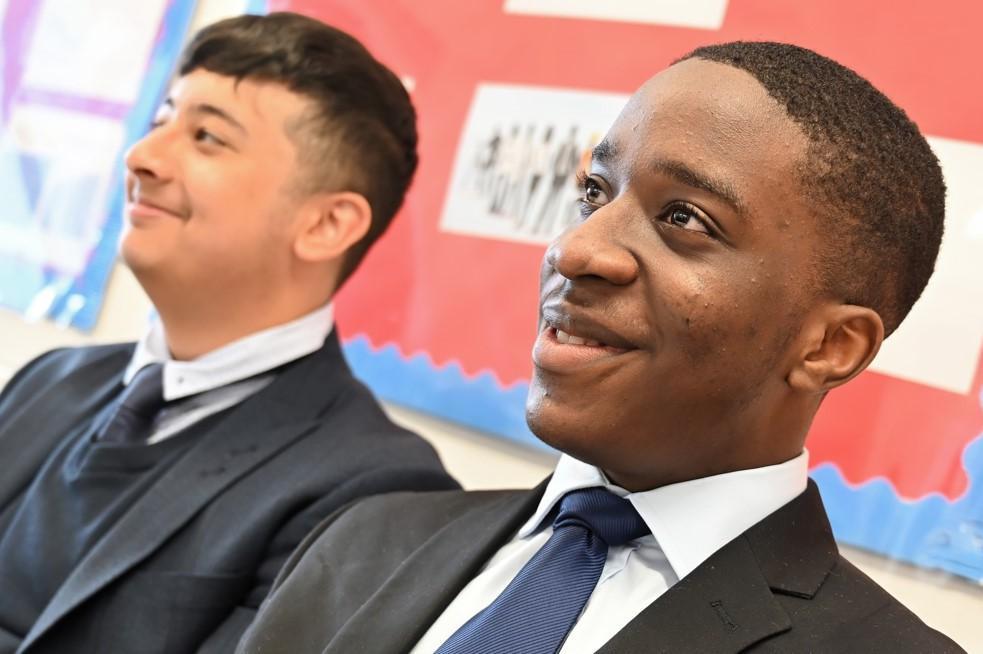
EXTRA CURRICULAR OPPORTUNITIES & OTHER INFORMATION
Exam Board: AQA
Exam Specification
There is a book club available to accompany the course Recommended Subject Combinations
Psychology
Philosophy & Ethics
History
Economics
Geography
WHAT CAREERS DOES THIS LEAD TO?
Higher Education
Degrees in: Sociology, Law, Social Policy, Criminology, Politics Careers
Employment in: Police, Journalism, Law, Politics, Human Resources, Public Relations, Media, Education, Marketing
ENTRY REQUIREMENTS
Grade 6 in GCSE English Language
Grade 5 in GCSE Maths
Grade 6 in GCSE History and/or Geography

Cambridge Technical in IT
WHAT WILL I LEARN?
Autumn Spring Summer
Unit F160: Fundamentals of application development –Examined Unit
• Types of software used in application design
• Software development models
• Planning application development projects
• Application design scoping
• Human computer interface and interaction
• Job roles and skills
Unit F161: Developing application software – Examined Unit
• Application software considerations
• Data and flow in application software
• API and protocols
• Application software security
• Operational considerations
• Legal considerations
Unit F162: Designing and communicating User Experience (UX) /User Interaction (UI) solutions
• Principles of UX and UI design
• Plan UX/UI solutions
• Design UX/UI solutions
• Communicate UX/UI solutions
• Review and improve UX/UI solutions
F163: Game Development
• Game design
• Plan and design highfidelity game prototypes
• Create high-fidelity game prototypes
• Test high-fidelity game prototypes
• Review and improve highfidelity game prototypes
F164: Website development
• Fundamentals of website development
• Plan and design high-fidelity website prototypes
• Create high-fidelity website prototypes
• Test high-fidelity website prototypes
• Review and improve the effectiveness of high-fidelity website prototypes

EXTRA CURRICULAR OPPORTUNITIES & OTHER INFORMATION
Exam Board: OCR Level 3 Cambridge Technical in IT
Exam Specification
Recommended Subject Combinations
A Level or BTEC Business Studies
A Level Design & Technology
A Level Maths
WHAT CAREERS DOES THIS LEAD TO?
Higher Education
Degree in: Computing, Computer Engineering
Apprenticeships in: Management, Computing Careers
Employment in: Computer Science, Computer Games Development, Computing, Creative Computing, Web and Mobile Development, Web and User Experience Design
ENTRY REQUIREMENTS
Grade 5 in Maths
Grade 5 in English
M2 in creative media

BTEC Applied Science
WHAT WILL I LEARN?
Autumn Spring Summer Year 12
• Unit 1 Principles and Applications of Biology
• Unit 2 Principles and Applications of Chemistry
• Unit 3 Principles and Applications of Physics (Exam based module)
• Unit 4 Practical Scientific Procedures and Techniques (Coursework based unit)
13
• Unit 1 Principals and Applications of Biology
• Unit 2 Principles and Applications of Chemistry
• Unit 3 Principles and Applications of Physics (Exam based module)
• Unit 5 Science Investigation Skills (Coursework based unit)
• Unit 4 Practical Scientific Procedures and Techniques (Coursework based unit)
• Unit 5 Science Investigation Skills (Coursework based unit)

EXTRA CURRICULAR OPPORTUNITIES & OTHER INFORMATION
Exam Board: Pearson
Exam Specification
The Extended certificate course (equivalent of 1 A-Level) builds on the knowledge of all 3 Science GCSE disciplines (Biology, Chemistry, Physics)
Unit 1: Principals and Applications of Biology (external exam)
Unit 2: Principals and Applications of Chemistry (external exam)
Unit 3: Principals and Applications of Physics (external exam)
Unit 4: Practical Scientific Procedures and Techniques (internal coursework)
Unit 5: Science Investigation Skills (Internal coursework)
Recommended Subject Combinations
Any other BTEC course
A-Level Biology, Chemistry or Physics
PE
Higher Education
WHAT CAREERS DOES THIS LEAD TO?
Degree in: Science related subjects such as Biology and Chemistry Careers
Employment in: Nursing, Midwifery, paramedics.
ENTRY REQUIREMENTS

BTEC Sport
WHAT WILL I LEARN?
2 – Fitness Training and Programming for Health, Sport and Well-Being
• Lifestyle Factors
• Nutritional Needs
• Components of Fitness
• Training Methods
• Programme Design
Unit 1 – Anatomy and Physiology
• Muscular System
• Cardiovascular System
• Energy Systems
• Respiratory System
• Skeletal System
Unit 3 – Professional Development in the Sports Industry
• Careers in the Sports Industry
• Personal Skills Audits
• Career Development Action Plan
• Employability
Unit 4 – Sports Leadership
• Roles, Skills, Qualities and Characteristics of Effective Sports Leaders
• Psychological Factors
Unit 3 – Professional Development in the Sports Industry
• Job Applications
• Interviews
• Career Specific Pathways
• Evaluating Job Specific Roles
Unit 4 – Sports Leadership
• Expectations of Sports Leaders
• Practical Skills for Leading a Sports Session
• Impact on Leadership in Sport

EXTRA CURRICULAR OPPORTUNITIES &
OTHER INFORMATION
Exam Board: Pearson Edexcel
Exam Specification
Recommended Subject Combinations
Any other Level 3 BTEC qualifications such as:
Applied Medical Science
Business Studies
ICT
Higher Education
Degree in: Sport & Science, Biology
Careers

Employment in: Sports Scientist, Sports Psychologist, Sports Journalism, Sports Analyst, Gym Instructor/Personal Trainer, Nutritionist, Sports Coach, Events Management
ENTRY REQUIREMENTS
Grade 5-5 in GCSE Science
M2 or above in BTEC Level 2 Sports Diploma is desirable, but not essential
BTEC Sport (Double)
WHAT WILL I LEARN?
• Unit 2 Fitness Training and Programming for Health, Sport and Wellbeing (controlled assessment exam)
• Unit 22 Investigating Business in Sport
• Unit 25 Rules, Regulations and Officiating in Sport (coursework)
• Unit 5 Applications of Fitness Testing (coursework)
• Unit 1 Anatomy and Physiology (exam)
• Unit 23 Skill Acquisition (coursework)
• Unit 8 Coaching for Performance (coursework)
• Unit 5 Applications of Fitness Testing (coursework)
• Unit 3 Professional Development in the Sports Industry (coursework)
• Unit 22 Investigating Business in Sport
• Unit 25 Rules, Regulations and Officiating in Sport (coursework)
• Unit 5 Applications of Fitness Testing (coursework)
• Unit 3 Professional Development in the Sports Industry (coursework)
• Unit 23 Skill Acquisition (coursework)
• Unit 25 Rules, Regulations and Officiating in Sport (coursework)
• Unit 5 Applications of Fitness Testing (coursework)
• Unit 4 Leadership in Sport (coursework)
• Unit 23 Skill Acquisition (coursework)
• Unit 8 Coaching for Performance (coursework)
• Unit 5 Applications of Fitness Testing (coursework)
• Unit 4 Leadership in Sport (coursework)
• Unit 23 Skill Acquisition (coursework)
• Unit 8 Coaching for Performance (coursework)
• Unit 5 Applications of Fitness Testing (coursework)
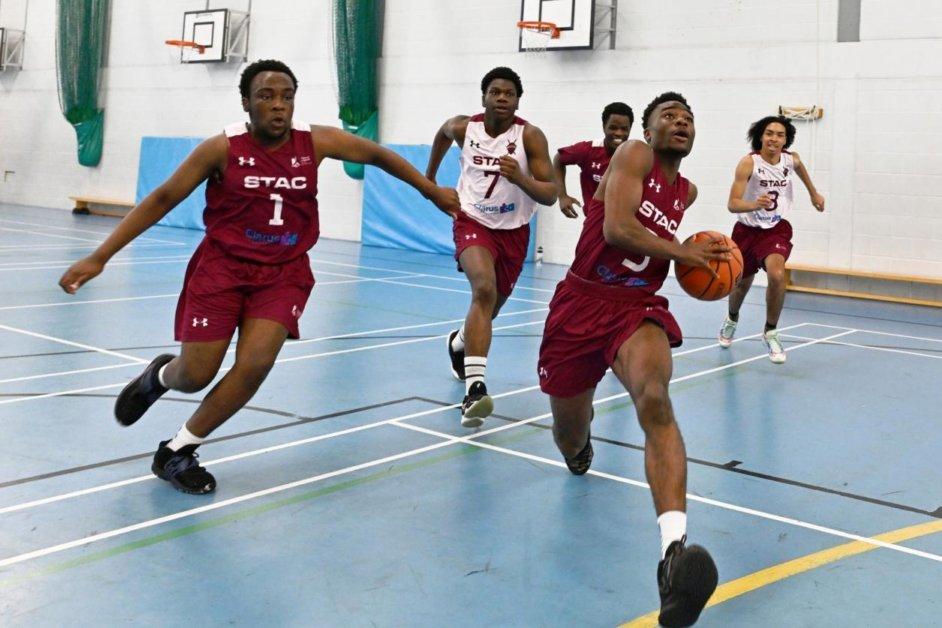
EXTRA CURRICULAR OPPORTUNITIES &
OTHER INFORMATION
Exam Board: Pearson Edexcel
Exam Specification
Recommended Subject Combinations
Any other Level 3 BTEC qualifications such as:
Applied Medical Science
Business Studies
ICT
Higher Education
Degree in: Sport & Science, Biology
Careers

Employment in: Sports Scientist, Sports Psychologist, Sports Journalism, Sports Analyst, Gym Instructor/Personal Trainer, Nutritionist, Sports Coach, Events Management
ENTRY REQUIREMENTS
Grade 5-5 in GCSE Science
M2 or above in BTEC Level 2 Sports Diploma is desirable, but not essential

